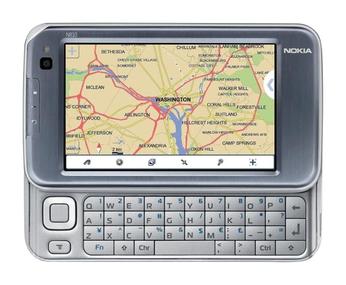New Nokia Tablet N810 with Keyboard and GPS
Nokia has just announced the latest version of its Linux-based tablet PC. The device comes with a 4.13 inch touch screen, and a full-fledged keyboard.
The N810 is the third generation Internet tablet PC by Nokia. It will be available as of November for around 450 euros. Like its predecessors, the N810 does not include wireless technology and relies on an external WLAN or mobile phone for Web use or VoIP.
The N810 includes a Mozilla Web browser with Ajax, Adobe Flash 9, the Skype VoIP solution, a camera, and a player. The device has the familiar slide-out type keyboard used by many mobile phones. New features include a GPS receiver and preinstalled maps with points-of-interest (POI), although it is currently unclear what areas the maps will cover.

Nokia 810 with slide-out keyboard and GPS receiver. Source: Nokia
The Nokia N810 uses Maemo version OS2008, the free Linux distribution for mobile devices. According to the manufacturer, users of the predecessor, N800, will be able to update to the new version. Other features provided by the new tablet include an individually configurable interface and enhanced video and audio functionality.
In future, Nokia aims to provide support for the Maemo platform to free developers and enterprises via its own Nokia Forum. The vendor speaks of 3.4 million registered users who develop mobile applications for the Symbian Series 40 and Series 60 platforms.
Mobile devices of this type, especially those that use a Linux operating system have excellent market prospects, and the market is highly competitive due to this. Just recently, CPU manufacturer ARM entered into a cooperation with six partners to work the market (see the separate news item here), and Intel is also collaborating with the company behind Ubuntu, Canonical, on a mobile platform (see the separate news item here).
Subscribe to our Linux Newsletters
Find Linux and Open Source Jobs
Subscribe to our ADMIN Newsletters
Support Our Work
Linux Magazine content is made possible with support from readers like you. Please consider contributing when you’ve found an article to be beneficial.

News
-
Introducing matrixOS, an Immutable Gentoo-Based Linux Distro
It was only a matter of time before a developer decided one of the most challenging Linux distributions needed to be immutable.
-
Chaos Comes to KDE in KaOS
KaOS devs are making a major change to the distribution, and it all comes down to one system.
-
New Linux Botnet Discovered
The SSHStalker botnet uses IRC C2 to control systems via legacy Linux kernel exploits.
-
The Next Linux Kernel Turns 7.0
Linus Torvalds has announced that after Linux kernel 6.19, we'll finally reach the 7.0 iteration stage.
-
Linux From Scratch Drops SysVinit Support
LFS will no longer support SysVinit.
-
LibreOffice 26.2 Now Available
With new features, improvements, and bug fixes, LibreOffice 26.2 delivers a modern, polished office suite without compromise.
-
Linux Kernel Project Releases Project Continuity Document
What happens to Linux when there's no Linus? It's a question many of us have asked over the years, and it seems it's also on the minds of the Linux kernel project.
-
Mecha Systems Introduces Linux Handheld
Mecha Systems has revealed its Mecha Comet, a new handheld computer powered by – you guessed it – Linux.
-
MX Linux 25.1 Features Dual Init System ISO
The latest release of MX Linux caters to lovers of two different init systems and even offers instructions on how to transition.
-
Photoshop on Linux?
A developer has patched Wine so that it'll run specific versions of Photoshop that depend on Adobe Creative Cloud.
